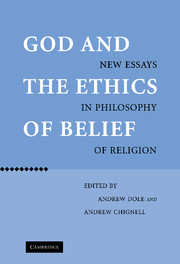Book contents
- Frontmatter
- Contents
- List of Contributors
- Acknowledgments
- The Ethics of Religious Belief: A Recent History
- PART ONE METAPHYSICS: GOD AND CREATURES
- PART TWO EPISTEMOLOGY: GOD AND THE ETHICS OF BELIEF
- 5 The Probability of the Resurrection
- 6 Is God an Unnecessary Hypothesis?
- 7 Direct Warrant Realism
- PART THREE SOCIAL-POLITICAL PHILOSOPHY: GOD, ETHICS, AND BELIEF
- Index
7 - Direct Warrant Realism
Published online by Cambridge University Press: 25 July 2009
- Frontmatter
- Contents
- List of Contributors
- Acknowledgments
- The Ethics of Religious Belief: A Recent History
- PART ONE METAPHYSICS: GOD AND CREATURES
- PART TWO EPISTEMOLOGY: GOD AND THE ETHICS OF BELIEF
- 5 The Probability of the Resurrection
- 6 Is God an Unnecessary Hypothesis?
- 7 Direct Warrant Realism
- PART THREE SOCIAL-POLITICAL PHILOSOPHY: GOD, ETHICS, AND BELIEF
- Index
Summary
DIRECT REALISM AND DIRECT WARRANT REALISM
Direct realism often emerges as a solution to a certain type of problem. Hume and, especially, Berkeley, wielding some of the most powerful arguments of eighteenth-century philosophy, forcefully attacked the notion that there could be good inferences from the occurrence of one's sensations to the existence of external, mind-independent bodies (material objects). Given the success of these attacks, and also given the assumption, made by Berkeley and arguably by Hume as well, that our knowledge of and rational belief in the existence of material objects would depend upon there being such good inferences, a problem arises: we cannot know of or rationally believe in the existence of material objects. Reid's Direct Realism then emerges as the solution to this problem. Reid admits the success of Berkeley's and Hume's attacks against the possibility of successfully grounding our material world beliefs on inferences from our sensations, but claims that our belief in the existence of material objects can be perfectly rationally acceptable, and can amount to knowledge, despite the lack of such inferences. Though he did not use the terminology, it seems to be Reid's position – and it's this position that I will be referring to as his “Direct Realism” here – that certain perceptual beliefs whose content is such that they imply the existence of material objects are properly basic: they are rationally held, and if true, can amount to knowledge, without having to be based on any other beliefs, including, most notably, beliefs about one's own sensory experiences.
- Type
- Chapter
- Information
- God and the Ethics of BeliefNew Essays in Philosophy of Religion, pp. 150 - 172Publisher: Cambridge University PressPrint publication year: 2005
- 2
- Cited by

